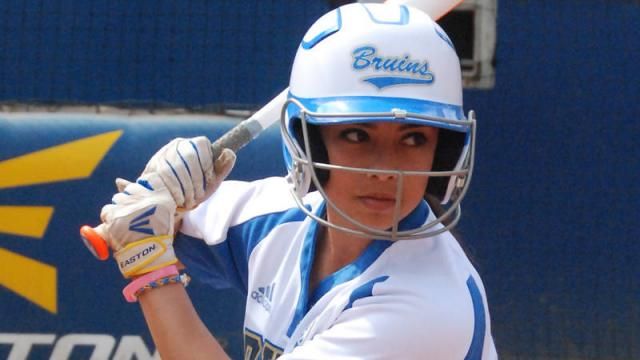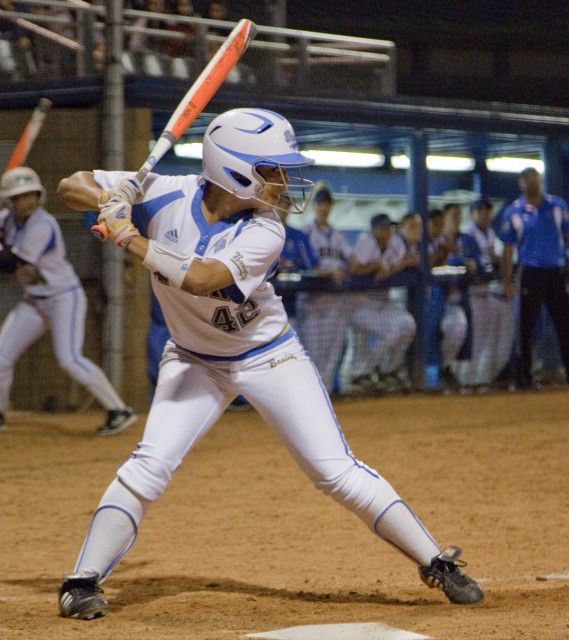UCLA will retire number 42 across all sports in honor of Jackie Robinson, it was announced today by UCLA Director of Athletics Dan Guerrero.
“Jackie Robinson established a standard of excellence to which people the world over should aspire,” said Guerrero. “On the 75th anniversary of Jackie’s arrival at UCLA, we want to ensure that his is a legacy to be upheld and carried forward by Bruins for generations to come. While he wore several numbers at UCLA, Jackie Robinson made the number 42 as iconic as the man himself. For that very reason, no Bruin will be issued the number 42 – in any sport – ever again.”
All three UCLA student-athletes who currently wear number 42, senior women’s soccer defender Ally Courtnall, sophomore women’s softball utility player Jelly Felix and freshman football linebacker Kenny Young, will each be able to finish out their Bruin career donning the iconic number.
“When I think of his number, I think of greatness, strength, courage, and all of those kind of qualities that Jackie Robinson encompassed and exemplified in his life,” said Courtnall. “If I could only be somewhat close to that, it would be amazing. It is such an honor to have his number on my back. I just see him as such a great example. I look at that number before every game, and I hope to do my family and the number proud.”
With UCLA players wearing number 42 on their helmets and Robinson’s iconic number 42 painted onto the Rose Bowl field, UCLA made the announcement during the break between the first and second quarters of its annual crosstown rivalry football game. In conjunction with UCLA, the City of Pasadena and the Rose Bowl Operating Committee, the Rose Bowl subsequently unveiled Jackie Robinson’s iconic #42 near the east scoreboard and will make it a permanent fixture in the historic stadium this offseason.
Additionally, UCLA will also permanently display Robinson’s number 42 inside each of its athletic competition venues.
The retirement of Robinson’s number 42 follows UCLA’s announcement on November 21 that a series of 22 athletic and recreation facilities across campus will be named the Jackie Robinson Athletics and Recreation Complex. Chief among the campus’ recognition of the complex will be an in-ground number 42 at each entry point to UCLA’s training centers, competition sites, fields and stadiums as a reminder of Robinson’s tremendous courage in the face of adversity.
“Jackie Robinson’s name and his legacy are an honor to this university, and to all the students and student-athletes who will continue to be inspired by his courage, dignity and grace,” said UCLA Chancellor Gene Block following Friday’s announcement. “Jackie detested injustice, fought for civil rights and his spirit of breaking barriers has been and always will be a guiding force of UCLA past, present and future.”
Seventy-five years ago, Jackie Robinson claimed a place at UCLA. From 1939 to 1941, he starred in four sports. In football, Robinson played both offense and defense, returned punts, caught and threw passes, kicked extra points and in the process, earned honorable mention All-American accolades. In basketball, he twice led the Pacific Coast Conference in scoring. In track, he won the NCAA championship in the broad jump. And in baseball, he began his legendary journey as a highly-regarded shortstop for the Bruins.
Six years later, Jackie Robinson claimed a place in history. Wearing number 42 for the Brooklyn Dodgers, on April 15, 1947, Robinson shattered the color barrier in Major League Baseball forever. Despite enduring racial abuse, jeers of fans and fellow players, death threats and profound harassment, he endured it all with grace and dignity - not to mention exceptional play - earning Rookie of the Year honors and a National League Most Valuable Player award in addition to helping the Dodgers win the 1955 World Series. A career .311 hitter, Robinson played in six World Series, six consecutive All-Star games was inducted into the Baseball Hall of Fame in 1962 during his first year of eligibility.
Fighting tirelessly for civil rights and integration in professional sports long after his time on the diamond was over, Robinson perhaps best summed up his own legacy with a typically understated yet poignant quote – “A life is not important except in the impact it has on other lives.”
















